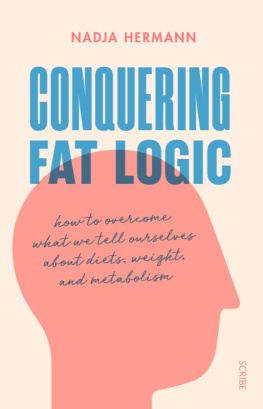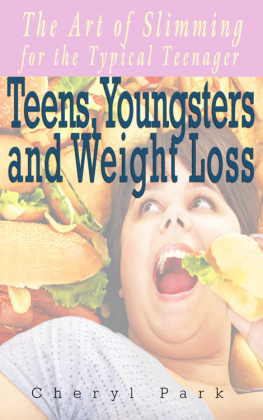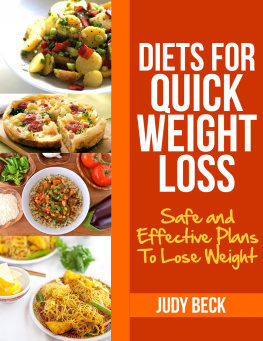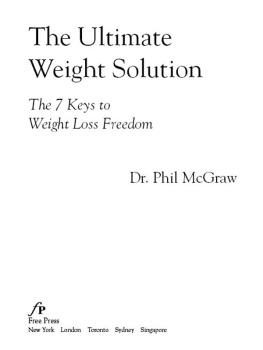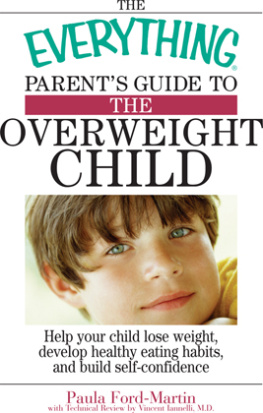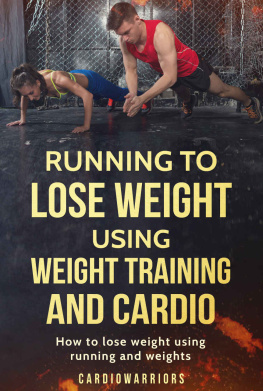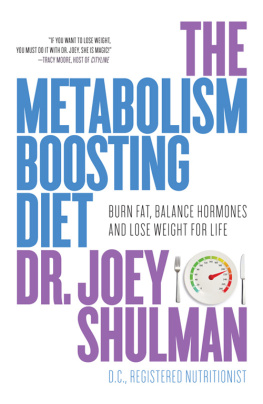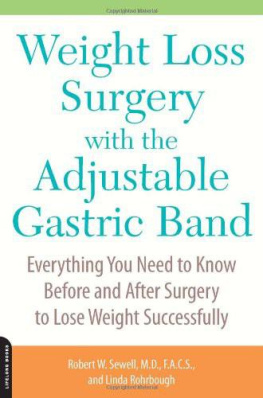
CONQUERING FAT LOGIC
Dr Nadja Hermann is a behavioural therapist with a background in nutritional science. She meticulously documented her own weight loss, researched countless scientific studies, drew cartoons to illustrate what she learned, and initially self-published an ebook in which she debunked all the old lies about losing weight. Along with the publication of her ebook, she also launched her blog fettlogik.wordpress.com, which has attracted many hundreds of followers. She lives with her husband in southern Germany.
Scribe Publications
1820 Edward St, Brunswick, Victoria 3065, Australia
2 John St, Clerkenwell, London, WC1N 2ES, United Kingdom
3754 Pleasant Ave, Suite 100, Minneapolis, Minnesota 55409, USA
First published in English by Scribe 2019
Copyright Ullstein Buchverlage GmbH, Berlin.
Originally published in German as Fettlogik berwinden in 2016 by Ullstein Taschenbuch Verlag
Translation copyright David Shaw 2019
All rights reserved. Without limiting the rights under copyright reserved above, no part of this publication may be reproduced, stored in or introduced into a retrieval system, or transmitted, in any form or by any means (electronic, mechanical, photocopying, recording or otherwise) without the prior written permission of the publishers of this book.
The moral rights of the author and translator have been asserted.
The contents of this book have been carefully researched and checked on the basis of sources considered trustworthy by the author. However, this book should not be regarded as a substitute for individual medical consultations. Please contact a qualified doctor for medical advice. The author accepts no responsibility for any negative effects which may arise in direct or indirect connection with this book.
9781925713206 (Australian edition)
9781911617365 (UK edition)
9781947534711 (US edition)
9781925693300 (ebook)
CiP records for this title are available from the National Library of Australia and the British Library.
scribepublications.com.au
scribepublications.co.uk
scribepublications.com
Contents
Foreword
As far back as I can remember, I was always overweight. Even as a child, I felt like a big lumbering oaf next to my three skinny stepsisters. It was so unfair, the way they were able to polish off huge portions of pizza or ice cream and not worry about their weight. When they came to visit and would stand giggling on the scales, not even knowing the significance of the numbers on its dial Fifty kilos, is that a lot? I would be painfully aware of the fact that I was almost twice that weight, even at the age of fifteen.
The difference was like night and day. While they came from a genetically thin family, my parents were morbidly obese in non-medical language, grossly overweight just like three of my grandparents (my maternal grandmother was only obese in other words, just fat). In my teenage years alone, I tried the Hay diet, the Atkins diet, the Hollywood diet, fasting, and more in my battle to become less overweight. I repeatedly lost up to 15 kg, but the yo-yo effect would kick in and I would soon pile that weight back on.
When I was twenty, I weighed more than 130 kg. Then I went on a crash diet and in just a few months starved myself down to a weight of 68 kg, with a body height of 175 cm. It was the first time in my life that I had been in the normal weight range for my size. It didnt last long. My metabolism had slowed down completely and as a result I just kept gaining weight again. When I was eventually diagnosed with hypothyroidism, I concluded that so-called normal weight just wasnt realistic for me. In my case, it would mean a life of permanent hunger and self-torture. After some reading, I found that such a life wasnt necessary: excess weight was demonised without reason. I might be fat, but I didnt smoke, drink, consume fast food, or eat red meat. And I was physically fit, apart from my excess weight.
I decided to set other priorities in my life I completed my doctorate in psychology, trained as a psychotherapist, got married, and started renovating an old house. At the age of thirty, I tipped the scales at 150 kg, but was not limited in life by my weight. In short, I was happy with my conscious decision to enjoy life rather than leading an existence of constant hunger and self-denial.
I was open about my weight and, in general, it was not an issue for my husband, my friends, or the people I encountered through work. If asked, I said I was comfortable with my weight and that my only wish, if anything, was to get a little more active and be a bit fitter. But at that same time, I was visiting an obesity clinic as an outpatient and enquiring about a stomach stapling operation. I kept this fact secret from everyone because I didnt want to face the questions it would have prompted about my claim to be comfortable with my weight. For various reasons, I eventually decided not to have the operation, and instead I buried myself even deeper in studies that showed that being overweight was not really harmful.
My doctor never mentioned my weight, but I rarely went to the doctors anyway. Not because I was never sick, but because I didnt want to be confronted with the problem of my weight. Every time I did go, my blood pressure was enormously high, but I dismissed it as white-coat hypertension. In fact, my blood pressure was just as high at home. To reduce it, I stopped taking the pill and started drinking a litre and a half of green tea every day, having read research that said that both things would help lower my blood pressure. And actually, it did go down slightly. It was still far too high, but I was relieved at the improvement I saw. I managed to ignore the fact that I was suffering frequent back pain and that I was having trouble sleeping, in part because of my heavy snoring.
This went on until one day I slipped while doing housework and injured my knee. I know now that I tore my cruciate ligament, but at the time my doctor said it was probably nothing to worry about and prescribed me ibuprofen. And its true that after a week I was able to walk again without pain. From then on, I would sometimes feel a twinge in my knee, and it was susceptible to spraining, which would hurt for a few days, but the pain was tolerable.
Then I had another accident while renovating our house. This time, I ruptured my meniscus. Again, my doctor told me it was probably nothing serious, gave me ibuprofen and no, this time it did not get better within a week. I walked with a limp for months, but my knee improved enough for me to be able to function in day-to-day life. After six months I must have pulled my meniscus or torn it again because I was laid low for another several weeks, unable to move. Six months later, the same thing happened again.
That last time was the straw that broke the camels back. After more than a year of pain and restricted mobility, I had a breakdown. I realised that, over the previous few years, my health had decreased while my weight had continuously increased. And I knew that if I kept going this way, within a few years I would be severely morbidly obese and unable to walk and still in my early thirties!
Something had to change. For the first time in my life, I consciously started thinking about my eating behaviour and began reading research on genetics, metabolism, diets, and obesity. Ironically, I was not a novice in this field. Id graduated from a high school specialising in nutritional science, and my dissertation in psychology focused on diets. However, in my private life, although I followed the topic, I did so selectively looking only at what I wanted to see. Now, I began to explore the 95 per cent of the research that I had turned a blind eye to before.
Next page
